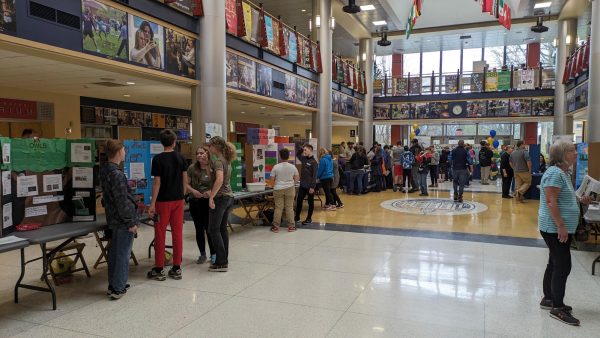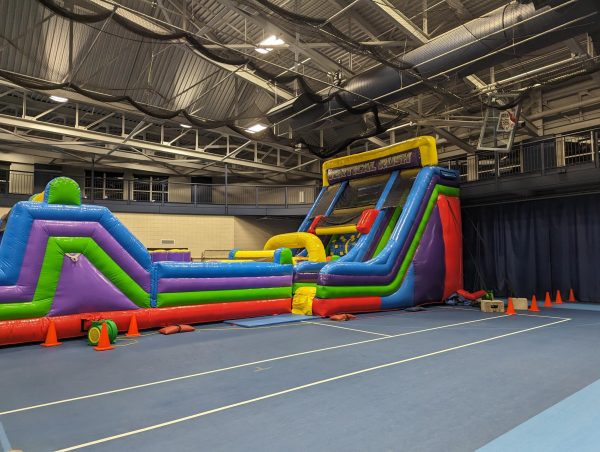Alum acredits Allegheny with discovering career path
As an associate regional director for St. Jude Children’s Research Hospital, Ryan Reczek, ’03, is active in St. Jude’s community engagement and fundraising throughout western and central Pennsylvania, including the Up ‘til Dawn event, which occurs yearly on the Allegheny College campus. Before working at St. Jude, Ryan organized fundraising and community events and awareness for several organizations including the American Heart Association, American Liver Foundation and the American Cancer Society.
Campus: What drove you to work for St. Jude, and particularly this area of its operation?
Reczek: Actually, Allegheny did. When I was a student, I was planning on going into marketing or advertising, so I was a communication arts major. Late in my sophomore year, two of my friends suggested I speak with the assistant director of Student Involvement at the time, Keri Fadden. So Kerri and I started talking about bringing an Up ‘til Dawn event to campus.
It’s a fundraiser for St. Jude, so her and I along with two other students went to Memphis, Tennessee, which is where St. Jude is located, and I fell in love.
I applied for an internship the year we hosted the event, where we raised about $30,000 and had about 250 students there. So I interned for St. Jude then, and it turned into a job for me.
Campus: What would you say is the most rewarding part of your work?
Reczek: Honestly, it’s our mission. St. Jude has so many people who work so hard to cure and understand childhood cancer. We’re a specialty hospital. We don’t treat the flu, we focus on those catastrophic types of illnesses.
My job is to help raise funds and engage the public in what St. Jude does so we can treat the children. And I think that, especially for St. Jude in particular, no family ever pays, they don’t pay for their treatment, their housing, their travel or their food while they’re at St. Jude. We take care of all that, which is why we have a national and international presence in fundraising.
Because we treat kids from all 50 states and hundreds of countries from around the world. That’s the most rewarding—knowing that what I’m doing is going to help finding cures for pediatric cancer.
Campus: Would you say that your time at Allegheny prepared you to succeed professionally, whether it’s your time at St. Jude or elsewhere?
Reczek: One of the things I talk about with current students a lot, whether it’s Allegheny or other schools, is that the most important thing I took away from college is the ability to critically think.
I think that regardless of what your major is, you could, in many cases, so many kinds of jobs outside of your area.
There is so much time spent at Allegheny in helping students to understand, to think about a situation or a challenge from as many different angles as possible, to really evaluate it and then come up with your solution. I think that most students at Allegheny come in with that skill, but I know that Allegheny really kind of fine-tuned that for me and it’s been especially helpful in my career.
Campus: During your time at Allegheny, what did you like the most? Was there anything or anyone in particular that inspired you to go into this field?
Reczek: There were a lot of folks who I think inspired me. I had a lot of great professors.
Sadly, two of those who inspired me are no longer there.
Keri Fadden is definitely somebody who’s been a role model to me. She’s somebody who pushed me to really think through what I wanted to do, so I’m thrilled she’s still there.
And, honestly, Beth Watkins. She’s a professor in communication arts and theatre. She was my first freshman seminar professor, and I think she was somebody who really helped me to acclimate to Allegheny. I learned some things from her that I still use today, especially as it relates to interacting with folks.
Campus: Do you have anything else you would like to say to current students?
Reczek: The one area that I would encourage anyone who’s in an undergrad program today is, and I hate this term, personal branding.
Thinking about what your presence looks like. As somebody once told me, 99 percent of the decisions about your future are going to be made when you’re not in the room.
Thinking about what you put out there personally, whether it’s through your direct interactions, doing what you say you’re going to do for people, but also just thinking about what’s online about you.
If you’re going to go apply for a job, make sure that your Facebook is locked down or your Twitter, depending on what you put out there.
The old adage, ‘you never know who’s going to be your advocate,’ really rings true. Always thinking about how you can put your best foot forward and making sure that you have locked up all that stuff.






